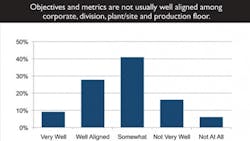"You can't manage what you don't measure" is a management adage that frequently gets trotted out when the conversational topic turns to performance measures. The challenge is the vast numbers of questions the adage begs, including: Who should measure? What should be measured? Do these measures drive improved business performances?
IndustryWeek sought the answers to some of these questions in a survey conducted during the summer in partnership with MESA (Manufacturing Enterprise Solutions Association) International. Some of the results answered those questions; others simply begged more questions.
One thing is clear: A majority of manufacturers employ performance metrics to improve their performance. Indeed, slightly more than a third (37%) said they "always" leverage such measures to boost their bottom line, while another 47% said they "sometimes" leverage metrics for that purpose.
Interestingly, the percentage of respondents who claimed to "always" leverage metrics typically increased as their position in the company declined. For example, 28% of respondents who identified their position as a senior executive or vice president-level executive said they always use metrics to improve performance. That percentage increased to 35% among department heads and grew to 50% among team leaders or supervisors. The steady increase fell apart at the "staff" level, where 40% claimed they always leverage metrics.
Nevertheless, data indicate that higher management positions may be more willing -- and able -- to stray from hard data to bolster their decisions. Among the seven deadly diseases of management outlined by quality guru W. Edwards Deming is that of running a company on visible figures alone. Is it possible the data show management's agreement with Deming?
Another interesting point: 4% of respondents reported that they "never" leverage metrics to improve performance.
Of course, leveraging performance metrics to improve business requires having performance measures available to make such decisions. Just 30% of the survey respondents said they were "very significantly" to "significantly" satisfied with the availability of performance measures. That may explain why a higher percentage isn't "always" leveraging such information.
Out of Alignment
Survey takers provided some additional evidence about why they may not be making greater use of performance metrics -- and possibly achieving better results. It's an alignment issue. Specifically, their business objectives and key performance metrics are not well aligned across their company, from the corporate level all the way down to individual plants and even to production lines. (Lean enthusiasts will recognize the process of deploying company vision, goals and performance targets across all levels of an organization as key to hoshin kanri, also known as strategy deployment).
Fewer than one in 10 respondents (9%) said their objectives and key performance metrics were "very well aligned," although that percentage grew to 37% when those who replied "well aligned" were added to the mix. Still, all evidence indicates that enterprise alignment remains challenging for many manufacturers.
Results Tell the Tale
Ultimately, the goal of performance metrics is to drive improved results. Otherwise, why bother? Data show better performances among companies that employ performance metrics more frequently, and poorer performances among manufacturers who never or rarely leverage metrics to improve performance. For example, of manufacturers who reported that their operating profit had grown by 15% or more in the past three years, more than 40% always leveraged metrics. In contrast, less than 10% said they never or not often leveraged performance metrics.
On the other hand, slightly more than 20% of respondents at companies with static or declining operating profit over the past three years reported never or rarely leveraging metrics. Slightly more than 30% of these firms said they always leverage metrics.
These survey results don't tell the complete tale, but they provide new data worth considering.
About the Author
Jill Jusko
Bio: Jill Jusko is executive editor for IndustryWeek. She has been writing about manufacturing operations leadership for more than 20 years. Her coverage spotlights companies that are in pursuit of world-class results in quality, productivity, cost and other benchmarks by implementing the latest continuous improvement and lean/Six-Sigma strategies. Jill also coordinates IndustryWeek’s Best Plants Awards Program, which annually salutes the leading manufacturing facilities in North America.
Have a story idea? Send it to [email protected].

